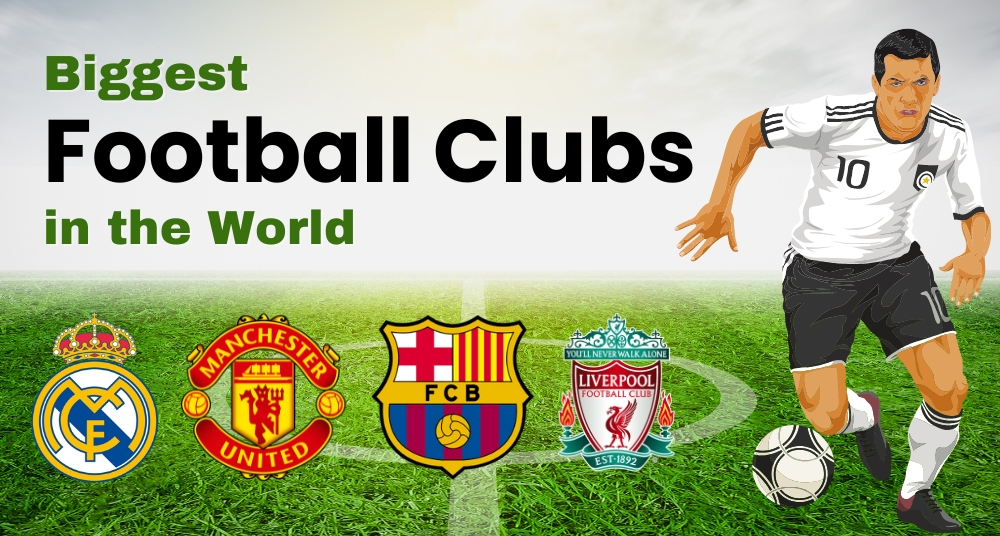Football, known as the world’s most popular sport, has an unparalleled ability to unite fans across continents. The global influence of football clubs extends far beyond the pitch; it impacts culture, economics, and even technology. Major clubs not only compete for trophies but also establish themselves as global brands, commanding immense financial value and dedicated fan followings. From merchandising to sponsorships and broadcast rights, football clubs generate billions annually, reflecting their significance in modern sports and business.
In 2026, the landscape of football clubs continues to evolve, with traditional powerhouses maintaining dominance and emerging clubs challenging the status quo. Understanding which clubs dominate globally requires examining performance, financial strength, fan engagement, and digital presence, all of which shape their impact on the sport and culture. This Guide explores the Biggest Football Clubs in World.
Evolution of Football Clubs Over Decades
The journey of football clubs from local teams to global brands is a story of evolution. In the early 20th century, clubs were primarily community-focused, built around local players and fan support. Matches were attended by local audiences, and the primary revenue came from ticket sales and small sponsorships.
By the mid-20th century, clubs began expanding their influence nationally and internationally through televised matches, international tournaments, and European competitions like the UEFA Champions League. The late 20th century saw commercialization reach new heights, with clubs leveraging merchandise, sponsorships, and international tours to grow their revenue streams.
The 21st century introduced digital transformation, with social media platforms, streaming services, and mobile apps providing clubs with direct access to global audiences. Clubs like Real Madrid and Manchester United capitalized on this shift, growing millions of fans worldwide and establishing themselves as cultural icons. Today, football clubs are not only sports entities but global brands with massive influence in media, entertainment, and digital spaces.
Key Factors Defining a Biggest Football Clubs in World
Several critical factors contribute to a football clubs global dominance:
- On-field Success – Consistent victories in domestic leagues and international tournaments create prestige and credibility.
- Financial Strength – Revenue from sponsorships, broadcasting rights, and merchandise allows clubs to invest in top players and facilities.
- Global Fan Base – A worldwide audience fuels demand for merchandise, match viewership, and social media engagement.
- Brand Strategy – Strategic marketing, collaborations, and international tours expand the club’s global reach.
- Digital Engagement – Apps, social media, and content creation enhance fan loyalty and interaction.
- Top Talent – Elite players elevate a club’s status, attracting attention from fans, sponsors, and media globally.
These factors intertwine to create clubs that dominate both on and off the pitch, establishing legacies that transcend generations.
Top 10 Biggest Football Clubs in World That Dominate
#1. Real Madrid
Founded: 1902 | Country: Spain | Stadium: Santiago Bernabéu
Real Madrid remains one of the most recognizable names in world football. The club has a record number of UEFA Champions League titles and continues to dominate La Liga. Known for its “Galácticos” era, Real Madrid has historically attracted the best talent, including Cristiano Ronaldo, Zinedine Zidane, and Sergio Ramos.
Highlights: Global fan base exceeding 500 million, robust merchandise sales, high-profile sponsorship deals, and an unmatched reputation in European football. Real Madrid also invests heavily in digital platforms to maintain fan engagement worldwide.
#2. Manchester United
Founded: 1878 | Country: England | Stadium: Old Trafford
Manchester United is a symbol of English football and global brand excellence. The club’s dominance was particularly notable under Sir Alex Ferguson, winning numerous Premier League titles and UEFA Champions League trophies.
Highlights: Massive international following, extensive merchandising network, and innovative marketing strategies. The club’s digital presence includes apps, social media campaigns, and interactive fan experiences, securing its place as one of the most recognized football brands globally.
#3. Barcelona
Founded: 1899 | Country: Spain | Stadium: Camp Nou
Barcelona is renowned for its attacking style and La Masia academy, which has produced legendary players like Lionel Messi, Xavi, and Iniesta. Their philosophy of “more than a club” (Més que un club) emphasizes cultural identity and global influence.
Highlights: Iconic domestic and European performances, strong social media presence, and consistent merchandising revenue. Barcelona also emphasizes digital content, enhancing fan engagement through apps, e-sports ventures, and interactive platforms.
#4. Liverpool
Founded: 1892 | Country: England | Stadium: Anfield
Liverpool FC has a rich history, with multiple English league titles and six UEFA Champions League trophies. Known for its passionate fan base and the famous anthem “You’ll Never Walk Alone,” Liverpool represents tradition and modern excellence.
Highlights: Consistent on-field success, global fan engagement, strong sponsorship deals, and strategic digital marketing initiatives. Liverpool leverages digital platforms to connect with millions of fans worldwide, enhancing the club’s influence and revenue.
#5. Manchester City
Founded: 1880 | Country: England | Stadium: Etihad Stadium
Manchester City has emerged as a dominant force in English football, particularly after the Abu Dhabi United Group’s investment. City has revolutionized club management, sports science, and digital engagement.
Highlights: Premier League successes, advanced analytics-driven player recruitment, and significant social media following. City’s innovative approach to fan engagement includes mobile apps, streaming content, and virtual fan experiences.
#6. Bayern Munich
Founded: 1900 | Country: Germany | Stadium: Allianz Arena
Bayern Munich represents German football’s consistency and success. With multiple Bundesliga titles and UEFA Champions League victories, Bayern remains a symbol of professionalism and elite talent development.
Highlights: Loyal domestic and international fan base, financial stability, merchandising excellence, and digital initiatives that enhance global reach. Bayern’s investments in e-sports and content-driven platforms ensure it stays relevant in the modern football ecosystem.
#7. Paris Saint-Germain (PSG)
Founded: 1970 | Country: France | Stadium: Parc des Princes
PSG has risen to prominence in the 21st century, fueled by Qatari investment and world-class players like Neymar, Mbappé, and Messi. The club combines French football excellence with a strong international brand strategy.
Highlights: Ambitious recruitment, global marketing campaigns, luxury brand collaborations, and robust digital engagement. PSG leverages social media and apps to attract younger fans, solidifying its global dominance.
#8. Arsenal
Founded: 1886 | Country: England | Stadium: Emirates Stadium
Arsenal is renowned for its “Invincibles” season and long-standing presence in English football. The club emphasizes youth development, attractive football, and strategic global outreach.
Highlights: Strong merchandising network, active digital campaigns, international fan tours, and investment in innovative fan engagement platforms. Arsenal continues to grow its brand internationally through strategic collaborations and digital initiatives.
#9. Tottenham Hotspur
Founded: 1882 | Country: England | Stadium: Tottenham Hotspur Stadium
Tottenham has grown steadily, combining modern infrastructure with competitive Premier League performances. The club is known for cultivating young talent and emphasizing tactical football.
Highlights: New stadium with fan-friendly features, global outreach programs, and digital initiatives for fan engagement. Tottenham also invests in e-sports and online content, appealing to younger audiences worldwide.
#10. Chelsea
Founded: 1905 | Country: England | Stadium: Stamford Bridge
Chelsea FC is a symbol of ambition and modern football investment. Success under various managers and significant international fan engagement has positioned the club as a global powerhouse.
Highlights: Premier League and UEFA Champions League victories, global merchandising, innovative fan experiences, and digital-first initiatives. Chelsea’s focus on technology and global marketing ensures sustained international relevance.
Forbes’ list of the most valuable football clubs
| Rank 2025 | Club | Country | Value ($B) | % Growth | Revenue ($M) |
| 1 | Real Madrid | Spain | 6.75 | 2% | 1,129 |
| 2 | Manchester United | England | 6.6 | 1% | 834 |
| 3 | Barcelona | Spain | 5.65 | 2% | 821 |
| 4 | Liverpool | England | 5.4 | 1% | 773 |
| 5 | Manchester City | England | 5.3 | 4% | 901 |
| 6 | Bayern Munich | Germany | 5.1 | 2% | 827 |
| 7 | Paris Saint-Germain | France | 4.6 | 5% | 870 |
| 8 | Arsenal | England | 3.4 | 31% | 771 |
| 9 | Tottenham Hotspur | England | 3.3 | 3% | 666 |
| 10 | Chelsea | England | 3.25 | 4% | 591 |
Financial Strength and Brand Value of Leading Football Clubs
The financial prowess of top football clubs is central to their dominance. Clubs generate revenue through multiple channels:
- Broadcasting Rights: Major leagues and UEFA competitions provide substantial revenue streams.
- Sponsorships: Global brands invest heavily in partnerships with elite clubs.
- Merchandising: Jerseys, apparel, and collectibles contribute significantly to annual income.
- Matchday Revenue: Ticket sales and hospitality packages continue to provide steady revenue.
In 2026, Real Madrid, Manchester United, and Barcelona lead in brand valuation, with each club exceeding billions in global valuation. Their strategic investments in marketing, global tours, and digital content sustain their financial dominance.
Role of Digital Transformation in Modern Football Clubs
Digital innovation has transformed how football clubs engage with fans. Apps, live streaming, virtual reality experiences, and social media platforms provide direct access to millions worldwide. Clubs now analyze fan data to tailor experiences, launch targeted marketing campaigns, and enhance engagement. Digital initiatives include:
- Interactive apps for live match stats and exclusive content.
- AI-driven fan engagement through personalized notifications.
- Global live streaming and e-sports collaborations.
By embracing digital transformation, football clubs like Manchester City, PSG, and Barcelona maintain relevance and grow their influence across generations and continents.
Global Fan Base and Social Media Presence
A strong global fan base enhances a club’s brand value. Clubs leverage platforms like Instagram, TikTok, and Twitter to interact with fans, share content, and build loyalty. Social media metrics, follower counts, and engagement rates often rival those of entertainment brands, reflecting the global appeal of football.
Top clubs use innovative campaigns, behind-the-scenes content, and interactive fan experiences to strengthen relationships with audiences, ensuring sustained relevance and loyalty worldwide.
Top Players Who Elevated These Clubs Globally
Players significantly influence a club’s global perception. Icons like Lionel Messi, Cristiano Ronaldo, Kylian Mbappé, Robert Lewandowski, and Neymar have not only contributed to on-field success but also amplified brand visibility.
Their transfers, endorsements, and social media presence attract fans globally, contributing to merchandising sales and digital engagement. Elite players are central to the strategy of world-dominating clubs, shaping both performance and perception.
Future Trends in Global Football Clubs’ Dominance
The future of football club dominance will be influenced by:
- Emerging Technologies: AR, VR, and AI will enhance fan experiences.
- Global Expansion: Clubs will continue building fan bases in Asia, North America, and Africa.
- Sustainability Initiatives: Environmental responsibility will shape brand image.
- Youth Development: Investment in academies ensures long-term talent pipelines.
- Data-Driven Decisions: Performance analytics and fan engagement strategies will drive growth.
Clubs embracing innovation, sustainability, and global outreach are likely to dominate in 2030 and beyond.
How Synarion IT Solutions Powers Sports App Development?
Modern football clubs rely heavily on technology to connect with fans. Synarion IT Solutions offers specialized sports app development, helping clubs create engaging platforms for fan interaction. Features include:
- Live scores, match highlights, and player stats.
- Ticketing and merchandising integrations.
- Gamification, leagues, and interactive fan challenges.
- AI-driven personalization and analytics.
By leveraging Synarion IT Solutions, clubs can expand digital presence, enhance fan engagement, and monetize online interactions effectively, reinforcing their global dominance.
Final Thoughts
The Biggest Football Clubs in World are a blend of on-field excellence, strategic branding, financial strength, and digital innovation. Real Madrid, Manchester United, Barcelona, and others have transcended national boundaries to become cultural icons with massive influence.
As football continues to evolve, clubs that integrate technology, invest in talent, and engage global audiences will maintain their position at the pinnacle of the sport. The combination of tradition, innovation, and strategic vision ensures that these clubs remain the biggest names in the game for years to come.






What do you think?
It is nice to know your opinion. Leave a comment.